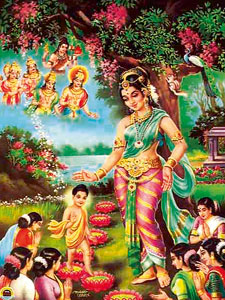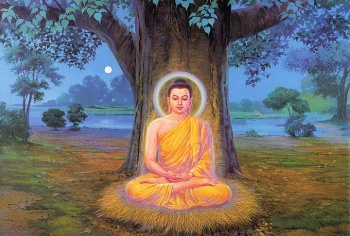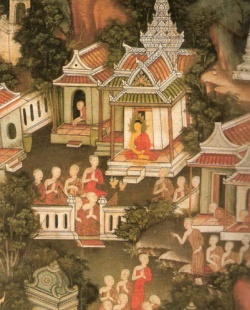Vesak - Some historical facts
The Buddhists all over the world await the arrival of the Vesak Full Moon Day which falls on May every year to commemorate the birth, enlightenment and the passing away of the Buddha.
This thrice blessed Poya Day is of special significance to Buddhists everywhere, Sri Lanka in particular. This Poya plays a vital role in making a tremendous impact on the religious lives of the people. Vesak is celebrated with much grandeur and splendour combined with overflowing Shraddah.
The first event of great historic and cultural significance is the birth of the Buddha. This was his last birth. This great birth brought immense happiness to king and queen who were without children for twenty years.
Queen Maya saw a dream and ten months later Buddha-to-be was born. Maya Devi gave birth at Lumbini situated in the foot hills of the Himalayas, a quiet peaceful place full of shady Sal trees. On her way to her parents home in Devdaha while holding a branch of a Sal tree, the future Thathagatha was born. The ancient chronicles say that a Bodhi tree sprang up at Buddha Gaya on this day.
The most amazing event was setting foot on seven lotuses which were in full bloom to welcome the prince, saying Aggo hamasmi lokassa.... meaning 'chief am I in this world', because he was to be the Thathagatha later. At a royal ceremony He was named Siddhartha, which means 'wish fulfilled'.
He grew up as a royal prince well versed in the requisite arts. At 16 he married his princess cousin Yasodhara and lived happily.
According to the predictions of the Brahmins, King Suddhodhana eagerly awaiting the arrival of Buddha sent Kaludai born on the same day as Siddhartha with a retinue of 1000 to bring him down to Kimbulwathpura. He informed Buddha of the honoured invitation. He set out the long journey by foot and met the father on Vesak Full Moon Day. Here He performed His miracles (Yama Maha Pelahera) for the well-being of the Sakyans.
King Suddhodana did his best to keep him away from the truths in life - decay, disease and death despite His precautions, the tradition has it that the emergence of the four portends (sathara peranimithi) made him embark in the journey of search of bliss free from Jara, Vyadhi, Marana as mentioned in the Ariya Pariyeshana Sutta.
His search for the truth (Kim Kusala Gawesi) leading to enlightenment was the most significant event in human history. Taking a glimpse of His new born son, giving up His worldly life Bosath Siddhartha left the palace at midnight and the actual event of renunciation took place. His search for the truth commenced.
His first step on this path was to go to early sages and learn their doctrine. He soon realised that their teachings in no way leads to detachment. He then started His known meditation. He continued every form of self mortification (Dushkara Kriya) until He was reduced to skin and bone. His loyal disciples deserted Him.
Totally isolated, walked along the banks of the Neranjana river. There under the shade of an Asatu tree He put an end to His search, determined to find the eternal truth with an iron will. Through deep meditation supreme enlightenment dawned upon Him.
The four noble truths was revealed. He was now a Buddha. He saw his own existence as well as those of others. He proceeded to Saranath and it was here that He preached His first sermon to the five ascetics and set in motion the wheel of the Dhamma with time, numerous disciples from all over rallied round Him.
The Buddha said "go forth bhikkus into the world taking the message to them, explain to them what I have explained." Buddha Himself showed the world how one could be of service by meeting those in distress those suffering in pain.
Out of loving kindness and compassion he relieved the monk Puthigathathissa from agonizing pain. Angulimala the dreadful terroris became an Arahant. Kisa Gotami, Patachara, Ambapali, Rajjumala, Suneetha, Sopaka were inspired to find solace.
Examples like these are too numerous to be mentioned. With His wealth of Meththa He walked on dusty rough roads in North India preaching his doctrine the Buddha's way of life and His akalika Dhamma.
It was also on a Vesak Full Moon Day that after a successful Ministry of 45 years, at the ripe age of 80 that Mahaparinirvana, the great passing away took place. Buddha knew His end was near and when He set out on His last journey with Ananda thera from Vesali, He told Ananda, "This will be the last time that Thathagatha will see Vesali."
They came to Pava where Chunda offered alms to the Buddha. That being the last meal, with great pain He continued the journey to Kusinara in the Kingdom of Mallas. Ananda was weeping when Buddha gratefully recalled His love and devotion to the Buddha and predicted that Ananda will certainly be an Arahant.
He was anxious that Chunda should not be blamed and praised him of his good Karma. His last words to the disciples surrounding Him, "Listen now bhikkus, decay is inherent in all things (Sabbe Sankara Anicca) Work out your salvation with diligence."
With these words He passed His last breath on the robe laid slab of stone between the twin Sal trees. It was also on a Vesak Full Moon Day that He expressed His delight in putting an end to the sansaric journey. It so happened on the last Vesak Poya Day.
]
The Vesak Full Moon Day also marks the attainment of Arahantship by Ananda the foremost disciple who passed away at the age of 121 as prophesied by the Buddha. The body of Thathagatha was taken to Mukthabandana Chetiya, the sacred shrine of the Malla Kings, it was cremated with due honour. Later the relics were distributed and enshrined in stupas across Asia.
Another major event of Vesak Poya Day is the receipt of permission (Niyatha Vivarana) by Bosath Sumedha, to be the next enlightened one. This was given by Deepankara Buddha in his previous birth, with his divine vision and insight. Vesak Poya bears special significance to Sri Lanka for a number of reasons.
According to ancient chronicles Prince Vijaya and his 700 followers arrived in Sri Lanka on Vesak Full Moon Day that the Sakyamuni Gautama had passed away in Kusinara. This is undoubtedly a unique event in our cultural heritage - an important milestone in our religious history.
It was on a Vesak Full Moon Day that Buddha visited Kelaniya in the 8th year of his Buddhahood with 500 Arahants at the invitation of the Naga king Maniakkikha the ruler of Kelaniya, who accepted the teachings of the Buddha with great reverence.
Subsequently the Buddha arrived at Sripada at the invitation of deity Saman and placed his footprint on the Peak, hailed as the most venerated place blessed by the Buddha - a place where rich Buddhist heritage is preserved.
History reveals that it was on a Vesak Poya Day that King Devanampiyatissa sent envoys to Emperor Asoka requesting him to send the necessary requisites for his second coronation ceremony.
Another event of historic importance is the inauguration of the Ruwanmeliseya the largest chetiya built by the King Dutugemunu the national hero of Sri Lanka as well as Mahawamsa as mentioned by Thera Mahanama. It is said that there is no other chetiya which could be compared to this in the whole universe. The work of the above was begun on a Vesak Full Moon Day.


